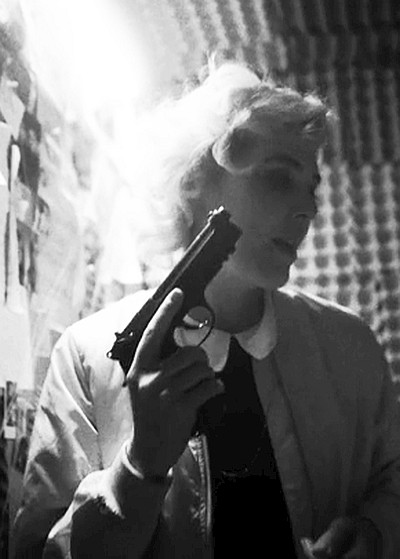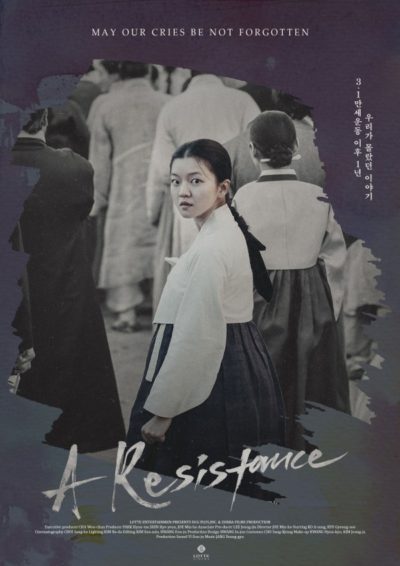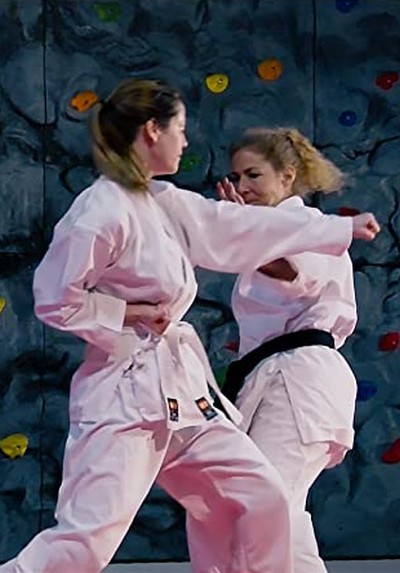 ★★★
★★★
“Time changes everything… or does it?”
DISCLAIMER: I have no knowledge on the backstory of this series. Grisaia Phantom Trigger – The Animation is the latest story in the Grisaia universe, that originally began as a series of “visual novels” (which as I understand, have more in common with a computer game), was then turned into a manga and the 13-episode anime series The Fruits of Grisaia which got two sequels, The Labyrinth of Grisaia (a TV movie) and The Eden of Grisaia (10 episodes), before we reached where we are here. GPT-TA is the new stand-alone film of that series, which came out last year and was also shown in cinemas. As none of the above mentioned series or films have been dubbed and released in Germany, my home country, I never saw anything before this movie. I belong to those anime fans who prefer to see their stuff in a language they can understand.
But that actually doesn’t matter at all, for this film serves as a very good introduction to the uninformed like myself. It therefore can be watched by those who have never seen an episode of this series before. As a matter of fact, the film consists of two longer episodes, combined into a movie, that thus tells us two separate stories. The first part serves as an introduction, which I felt was a bit dialogue-heavy. The second half was around 15 minutes longer than the first and provided more of the action stuff that fans love. But the way it was done was very nice.
 So, what’s it all about? There was a US-Japanese anti-terrorism organisation called CIRS: after having become public knowledge, a new agency for covert operations was created, called SORD (Social Ops, Research and Development). This organisation has established many schools within the country, where homeless poor orphans from unfortunate backgrounds are being trained and schooled to protect the country (meaning: to kill people).
So, what’s it all about? There was a US-Japanese anti-terrorism organisation called CIRS: after having become public knowledge, a new agency for covert operations was created, called SORD (Social Ops, Research and Development). This organisation has established many schools within the country, where homeless poor orphans from unfortunate backgrounds are being trained and schooled to protect the country (meaning: to kill people).
In this particular school, where the orphans consist solely of young girls, the teenagers are taken care of by a young man Haruto, who with his long hair almost looks like a woman himself. He could have his own interesting backstory – he doesn’t shoot, but has others do it for him – something I suspect happened in one of the prequel shows. Than there’s sharp-shooter Touka; the Russian Ninja Murasaki; hot-shot action-girl Rena, who’s totally devoted to her ‘Master’ Haruto; Chris, the “mother” of the team, a handsome woman; and the female (and underdressed!) director. There are a couple more characters, but they hardly have much more than a cameo.
The teen girls are nice, and love to banter and bicker with each other in the way normal pupils would in school. But when they are on a mission they make, as we say in Germany, “nails with heads” – meaning they definitely don’t take prisoners. Seeing these otherwise lovely girls, delivering head-shots here and there quite bewildering to me, It was also a bit much for the new teacher, Miss Arisaka, who is kidnapped in the first episode, though still decided she would continue her new job at this unusual school.
The second part then gets into the real action. It’s a more complex story about a comatose former agent who gets kidnapped from a ship. When the girls find him, he’s dead, his heart having been ripped out. The team finds out that the heart, that was originally supposed to go to a leader of the secret service, has been stolen by Russians who have been duped by the seller, who sold the same heart twice. After they recover the heart, they get tricked immediately again by a false courier. As young hot-shot Rena pursues the courier, and then the woman the heart has been given to, she finds out much to her surprise that the woman is her childhood friend Maki, with whom she spent time on the streets, trying to survive.
It’s that second act that makes me like this movie especially. Sure, the idea of hero and villain having a history together, is nowadays an old, almost beaten-to-death cliche. But unlike a recent Bond movie, where the connection is only unimaginatively drawn, and never given any emotional meaning, this small anime film does so much more (and better) with the idea. In that childhood, they called themselves “Sics” and “Bucks” – Rena found Maki behind a coffee shop – and lived on the streets, fighting for food, which they shared. A gangster decided that Rena should become a killer and Maki a prostitute, but as things went on also Maki became a killer, the right-hand woman for heartsick Russian mob boss, Alexej Nicolaijewich. She is as devoted to her master as Rena is to hers, leading to a very intense fight, first with guns then with bare hands.
 Though just 88 minutes long, this is very well done. The few short scenes of the childrens’ childhood give their fight more meaning then the talked about (but never really felt) conflict between for example 007 and 006 in GoldenEye. The fight itself is well-choreographed, looks believable (I’m very well aware I’m talking about an anime!), has exactly the right length and comes across as deliciously hard. And while the whole story about the stolen heart is solved in the end, I liked that this movie doesn’t end the way one would expect. The otherwise trigger-happy Rena doesn’t kill Maki, and also learns about her responsibility to follow orders from Haruto. So there’s a learning curve here.
Though just 88 minutes long, this is very well done. The few short scenes of the childrens’ childhood give their fight more meaning then the talked about (but never really felt) conflict between for example 007 and 006 in GoldenEye. The fight itself is well-choreographed, looks believable (I’m very well aware I’m talking about an anime!), has exactly the right length and comes across as deliciously hard. And while the whole story about the stolen heart is solved in the end, I liked that this movie doesn’t end the way one would expect. The otherwise trigger-happy Rena doesn’t kill Maki, and also learns about her responsibility to follow orders from Haruto. So there’s a learning curve here.
As Nicolaiewich has died peacefully, Maki has no interest in following the Russian gangsters: her obligation was to Nicolaiewich not the organisation. Following Rena’s request, Haruto is taking her under his wing to become a new member of the team. I liked this ending as something different to what a Hollywood actioner would typically serve us. Also, twisting cliches is something I find very rewarding storywise. It’s quite astonishing that big blockbusters in Hollywood can’t be written and directed with the same care as much smaller budgeted Japanese anime. The storytelling in Hollywood’s entertainment industry has really declined sharply, in my opinion. This movie shows you don’t need a big budget to add some more personal touches to your main characters.
The animation itself is well done – good but probably not great, as there are a couple of static images, probably to save money. Also remarkable: this anime was able to tell its story without the typical ecchi or anime humour, so no panty- or booby-shots. The main focus is on the drama and interaction of the different characters, though I couldn’t complain about the action. It was a good mix of both elements. Also, I can say the German dubbing was very well-done. The German voice actresses sound much more grown-up than those in the Japanese dub (I listened for a minute into it) where the girls sounded all very kawai, very cute… The dialogue itself sounded very believable in the German version, especially the bantering and the saucy/funny comments of the girls.
The only minor complaint in my book is that I felt this is a great beginning for a series I would like to continue. Unfortunately, it is (at least for the time being) the end point of the story as far as any German releases are concerned. Well, who knows… maybe the DVD label will now also release the sequel Grisaia Phantom Trigger – The Animation: Stargazer and the sequel series Grisaia: Phantom Trigger that was announced recently?
Dir: Motoki Tanaka
 I liked this considerably better than its predecessor. Part of that was, perhaps, knowing what to expect going in: a minimalist retelling, with occasional musical numbers. Except, this proved rather more than minimalist (though still very restrained), and there was hardly any singing at all. Curse you, Dumont, for confounding my expectations. It begins, much as Jeanette ended: with a lot of standing around in sand-dunes, chatting. However, the cast this time cannot be counted on the fingers of one hand, and there aren’t any staggeringly bad performances to take you out of the movie. You still don’t get any great battles. Instead, these are basically represented by team dressage, two groups of horses and riders, swirling around near each other.
I liked this considerably better than its predecessor. Part of that was, perhaps, knowing what to expect going in: a minimalist retelling, with occasional musical numbers. Except, this proved rather more than minimalist (though still very restrained), and there was hardly any singing at all. Curse you, Dumont, for confounding my expectations. It begins, much as Jeanette ended: with a lot of standing around in sand-dunes, chatting. However, the cast this time cannot be counted on the fingers of one hand, and there aren’t any staggeringly bad performances to take you out of the movie. You still don’t get any great battles. Instead, these are basically represented by team dressage, two groups of horses and riders, swirling around near each other.





 I did not originally expect to be reviewing this here. I watched it because of the technical elements, which I’ll get to in a bit. However, by the end, it does qualify – though you certainly wouldn’t think so from how things begin. It gets underway with Lili (Puig) waiting for a date arranged over the Internet with Eduardo (Alcantara). He shows up late, very apologetic after having been mugged, and having had his phone taken, but is utterly charming, and the chemistry with Lili is immediate. They end up back at his place for dinner. But as he’s cooking on the kitchen, the tone of the evening changes, when she hears his supposedly stolen phone going off in his jacket…
I did not originally expect to be reviewing this here. I watched it because of the technical elements, which I’ll get to in a bit. However, by the end, it does qualify – though you certainly wouldn’t think so from how things begin. It gets underway with Lili (Puig) waiting for a date arranged over the Internet with Eduardo (Alcantara). He shows up late, very apologetic after having been mugged, and having had his phone taken, but is utterly charming, and the chemistry with Lili is immediate. They end up back at his place for dinner. But as he’s cooking on the kitchen, the tone of the evening changes, when she hears his supposedly stolen phone going off in his jacket… This takes place in 1919-20, when Korea was under occupation by the Japanese [there seems to be quite a lot of this about; I’ve seen a bunch of Chinese movies set when that country was occupied by Japan as well]. Even demonstrating against the Japanese, or in favour of Korean independence, was sternly forbidden, with those taking part likely to be arrested and thrown in prison for months. If they were lucky, that is: an opening caption tells us 7,500 were killed in the protests or died in jail subsequently. Even for those merely arrested, this was not a “nice” prison, to put it mildly, with horrendously over-crowded conditions (24 to a cell!), freezing temperatures and meagre rations.
This takes place in 1919-20, when Korea was under occupation by the Japanese [there seems to be quite a lot of this about; I’ve seen a bunch of Chinese movies set when that country was occupied by Japan as well]. Even demonstrating against the Japanese, or in favour of Korean independence, was sternly forbidden, with those taking part likely to be arrested and thrown in prison for months. If they were lucky, that is: an opening caption tells us 7,500 were killed in the protests or died in jail subsequently. Even for those merely arrested, this was not a “nice” prison, to put it mildly, with horrendously over-crowded conditions (24 to a cell!), freezing temperatures and meagre rations. The concept here is intriguing. It’s just the execution – and the script in particular – which is bad. A robbery at a convenience store ends in the death of David, the husband to Victoria Garrett (Aldrich). She blames the paramedic on the scene, former soldier Maggie Hart (Holden), for the loss of her spouse, though the incident hits Maggie equally hard. She quits her job, raising daughter Jane (Blackwell) with her husband, commercial real-estate agent, Jason (Gerhardt). But Victoria hasn’t moved on – in probably the film’s most memorably loopy elements, she feeds her husband’s ashes to a pot-plant she calls David, to which she chats. She’s also clearly a believer in that saying about revenge being served cold.
The concept here is intriguing. It’s just the execution – and the script in particular – which is bad. A robbery at a convenience store ends in the death of David, the husband to Victoria Garrett (Aldrich). She blames the paramedic on the scene, former soldier Maggie Hart (Holden), for the loss of her spouse, though the incident hits Maggie equally hard. She quits her job, raising daughter Jane (Blackwell) with her husband, commercial real-estate agent, Jason (Gerhardt). But Victoria hasn’t moved on – in probably the film’s most memorably loopy elements, she feeds her husband’s ashes to a pot-plant she calls David, to which she chats. She’s also clearly a believer in that saying about revenge being served cold. ★★★
★★★ So, what’s it all about? There was a US-Japanese anti-terrorism organisation called CIRS: after having become public knowledge, a new agency for covert operations was created, called SORD (Social Ops, Research and Development). This organisation has established many schools within the country, where homeless poor orphans from unfortunate backgrounds are being trained and schooled to protect the country (meaning: to kill people).
So, what’s it all about? There was a US-Japanese anti-terrorism organisation called CIRS: after having become public knowledge, a new agency for covert operations was created, called SORD (Social Ops, Research and Development). This organisation has established many schools within the country, where homeless poor orphans from unfortunate backgrounds are being trained and schooled to protect the country (meaning: to kill people). Though just 88 minutes long, this is very well done. The few short scenes of the childrens’ childhood give their fight more meaning then the talked about (but never really felt) conflict between for example 007 and 006 in GoldenEye. The fight itself is well-choreographed, looks believable (I’m very well aware I’m talking about an anime!), has exactly the right length and comes across as deliciously hard. And while the whole story about the stolen heart is solved in the end, I liked that this movie doesn’t end the way one would expect. The otherwise trigger-happy Rena
Though just 88 minutes long, this is very well done. The few short scenes of the childrens’ childhood give their fight more meaning then the talked about (but never really felt) conflict between for example 007 and 006 in GoldenEye. The fight itself is well-choreographed, looks believable (I’m very well aware I’m talking about an anime!), has exactly the right length and comes across as deliciously hard. And while the whole story about the stolen heart is solved in the end, I liked that this movie doesn’t end the way one would expect. The otherwise trigger-happy Rena 

 This gets off to an impressive and intriguing start. Cora Fisher (Pribilski) has a perfectly normal life. Then, she’s involved in a car crash. The next thing she knows, she wakes up in a hospital bed. Oh, to which she is handcuffed. Before she can come to terms with that, she is informed that ten years have passed. And completing the triple-whammy, Texas Ranger Jim Krueger (Llorens) enters, and tells Cora he’s going to make sure she gets the death penalty for the murders she committed. It’s safe to say, the movie has successfully gained my attention by this point. Guided by mysterious cellphone texts, Cora escapes the hotel and goes on the run, seeking to find out the truth about what happened.
This gets off to an impressive and intriguing start. Cora Fisher (Pribilski) has a perfectly normal life. Then, she’s involved in a car crash. The next thing she knows, she wakes up in a hospital bed. Oh, to which she is handcuffed. Before she can come to terms with that, she is informed that ten years have passed. And completing the triple-whammy, Texas Ranger Jim Krueger (Llorens) enters, and tells Cora he’s going to make sure she gets the death penalty for the murders she committed. It’s safe to say, the movie has successfully gained my attention by this point. Guided by mysterious cellphone texts, Cora escapes the hotel and goes on the run, seeking to find out the truth about what happened.  Firstly, I’m not quite sure whether this is a movie or not. The IMDb lists it with a running time of 98 minutes, but Tubi had it as 4 x 25-minute episodes. I’m guessing the former is just a compilation of the latter, it works about the same either way. The title translates as “The way of the empty hand”, and the emphasis here is very much on the first part: the journey. The heroine is Nicki Wright (G. Niebauer), who has barely got out of rehab for alcohol problems, when she gets involved in a brawl, after seeing a woman being assaulted by a man. Her mother had had enough of dealing with Nicki’s taciturn BS, and dumps her on her father, Cliff (D. Niebauer).
Firstly, I’m not quite sure whether this is a movie or not. The IMDb lists it with a running time of 98 minutes, but Tubi had it as 4 x 25-minute episodes. I’m guessing the former is just a compilation of the latter, it works about the same either way. The title translates as “The way of the empty hand”, and the emphasis here is very much on the first part: the journey. The heroine is Nicki Wright (G. Niebauer), who has barely got out of rehab for alcohol problems, when she gets involved in a brawl, after seeing a woman being assaulted by a man. Her mother had had enough of dealing with Nicki’s taciturn BS, and dumps her on her father, Cliff (D. Niebauer). This is one of those cases where you can see what a film is trying to do. It just isn’t very good at doing it. In this case, the central character is Gina (Killips), who works as a collector of debts for the mysterious and reclusive “Max”. This is for reasons that become clear towards the end – yet, like a lot else in the film, it doesn’t actually prove to be of much significance. Her latest job involves locating a very large sum of money which went missing from his organization. Suspicion falls on Myles (Orille), and Gina is tasked with finding out whether he was indeed responsible and if so, what he did with the loot. To this end, Gina inserts herself into Myles’s life and comes under increasing pressure from her boss, Simon (Rumley), to get results for Max. But Gina is increasingly disenchanted with her profession, and also increasingly convinced of Myles’s innocence.
This is one of those cases where you can see what a film is trying to do. It just isn’t very good at doing it. In this case, the central character is Gina (Killips), who works as a collector of debts for the mysterious and reclusive “Max”. This is for reasons that become clear towards the end – yet, like a lot else in the film, it doesn’t actually prove to be of much significance. Her latest job involves locating a very large sum of money which went missing from his organization. Suspicion falls on Myles (Orille), and Gina is tasked with finding out whether he was indeed responsible and if so, what he did with the loot. To this end, Gina inserts herself into Myles’s life and comes under increasing pressure from her boss, Simon (Rumley), to get results for Max. But Gina is increasingly disenchanted with her profession, and also increasingly convinced of Myles’s innocence.